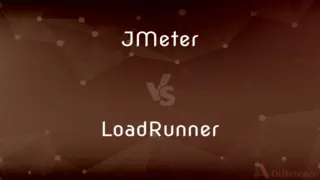Carbohydrates vs. Protein — What's the Difference?
Edited by Tayyaba Rehman — By Fiza Rafique — Published on January 1, 2024
Carbohydrates are macronutrients used primarily for energy. Proteins are macronutrients essential for body repair and enzymes.

Difference Between Carbohydrates and Protein
Table of Contents
ADVERTISEMENT
Key Differences
Carbohydrates serve as the body's main energy source, while protein is vital for building and repairing tissues. Carbohydrates break down into glucose, providing quick energy. Proteins, made up of amino acids, are used to produce enzymes, hormones, and other essential molecules in the body.
Carbohydrates can be simple or complex, based on their chemical structure. Simple carbohydrates are sugars with a quick energy release. Proteins, however, are complex molecules that work primarily to support the structure, functions, and regulation of the body's tissues and organs.
Dietary sources of carbohydrates include fruits, vegetables, grains, and sugars. These foods provide fiber and are digested to release energy. Protein-rich foods like meat, dairy, beans, and nuts are crucial for muscle repair and immune function.
Carbohydrates are stored in the body as glycogen for later energy use. Proteins, while they can be converted to glucose in emergencies, are not primarily used for energy but are crucial in creating antibodies and other immune responses.
The balance of carbohydrates and protein in the diet is vital for overall health. Carbohydrates provide the fuel for the body's energy needs, while proteins provide the essential components for growth and repair, making both indispensable but distinct in function.
ADVERTISEMENT
Comparison Chart
Primary Function
Energy source
Tissue repair and enzyme creation
Monomers
Monosaccharides
Amino acids
Energy Yield
4 calories per gram
4 calories per gram
Types
Sugars, starches, fibers
Enzymes, antibodies, structural proteins
Digestive Enzymes
Amylase, sucrase
Pepsin, trypsin
Compare with Definitions
Carbohydrates
Carbohydrates are organic compounds made of carbon, hydrogen, and oxygen, providing energy to the body.
Whole-grain foods are a good source of complex carbohydrates.
Protein
Protein is a critical component of every cell in the body, necessary for the structure, function, and regulation of tissues and organs.
Collagen is a protein that provides skin its elasticity.
Carbohydrates
Carbohydrates include sugars, starches, and fibers found in fruits, grains, vegetables, and milk products.
Carbohydrates in potatoes break down into glucose, fueling my run.
Protein
Proteins are large, complex molecules made up of chains of amino acids that perform many functions in the body.
Protein in eggs helps repair muscles after a workout.
Carbohydrates
Simple carbohydrates are digested quickly and can provide immediate energy.
Honey is rich in simple carbohydrates.
Protein
Protein can be obtained from animal and plant sources, including meat, dairy, legumes, and nuts.
Vegans get protein from lentils, quinoa, and tofu.
Carbohydrates
Complex carbohydrates have longer chains of sugar molecules and provide sustained energy.
Brown rice is a healthier option because it contains complex carbohydrates.
Protein
Dietary proteins are broken down into amino acids, which are then used to build new proteins as needed.
After digestion, protein from my chicken dinner will be used to make new cells.
Carbohydrates
Carbohydrates are stored in the liver and muscles as glycogen for future energy needs.
Carbohydrates consumed today are stored as glycogen for my workout tomorrow.
Protein
Proteins are used to make enzymes, hormones, and other body chemicals.
Insulin, a protein hormone, regulates blood sugar.
Carbohydrates
Any of a group of organic compounds, including sugars, starches, celluloses, and gums, that contain only carbon, hydrogen, and oxygen and that originate chiefly as products of photosynthesis. Carbohydrates serve as a major energy source for living things.
Protein
Any of a group of complex organic macromolecules that contain carbon, hydrogen, oxygen, nitrogen, and usually sulfur and are composed of one or more chains of amino acids. Proteins are fundamental components of all living cells and include many substances, such as enzymes, hormones, and antibodies, that are necessary for the proper functioning of an organism. They are essential in the diet of animals for the growth and repair of tissue and can be obtained from foods such as meat, fish, eggs, milk, and legumes.
Carbohydrates
A food, such as bread, rice, or potatoes, that is composed largely of these substances.
Protein
Any of numerous large, complex naturally-produced molecules composed of one or more long chains of amino acids, in which the amino acid groups are held together by peptide bonds.
Amino acid
Carbohydrates
Plural of carbohydrate
Protein
One of three major classes of food or source of food energy (4 kcal/gram) abundant in animal-derived foods i.e. meat and some vegetables, such as legumes.
Protein
A food rich in protein, often a meat or meat substitute.
Protein
In chemical analysis, the total nitrogenous material in vegetable or animal substances, obtained by multiplying the total nitrogen found by a factor, usually 6.25, assuming most proteids to contain approximately 16 per cent of nitrogen.
Protein
Any polymer of an amino acid joined by peptide (amide) bonds. Most natural proteins have alpha-amino acids as the monomeric constituents. All classical enzymes are composed of protein, and control most of the biochemical transformations carrie dout in living cells. They may be soluble, as casein, albumins, and other globular proteins, or insoluble (e. g. "structural proteins"), as collagen or keratin. "albumin", an older term for protein, is now used primarily to refer to certain specific soluble globular proteins found in eggs or blood serum, e.g. bovine serum albumin, the main soluble protein in teh serum of cattle, used as an enzymatically inert protein in biochemical research.
Protein
Any of a large group of nitrogenous organic compounds that are essential constituents of living cells; consist of polymers of amino acids; essential in the diet of animals for growth and for repair of tissues; can be obtained from meat and eggs and milk and legumes;
A diet high in protein
Common Curiosities
How are carbohydrates used in the body?
They're broken down into glucose and used for immediate energy or stored as glycogen.
Can carbohydrates and protein be converted into each other?
In metabolic processes, the body can convert proteins to glucose if needed, and vice versa, though it's not their primary function.
What is the role of protein in the body?
Proteins build and repair tissues, make enzymes and hormones, and support immune function.
Are all carbohydrates the same?
No, they can be simple like sugars or complex like starches and fibers.
What are carbohydrates?
They're organic molecules consisting of carbon, hydrogen, and oxygen, serving mainly as an energy source.
What are proteins?
Proteins are large biomolecules composed of amino acids, essential for bodily repair and chemical processes.
How many calories do carbohydrates and protein provide per gram?
Both provide 4 calories per gram.
Are fibers considered carbohydrates?
Yes, fibers are a type of complex carbohydrate that the body cannot digest.
Is protein important for weight loss?
Protein can help with weight loss by increasing satiety and preserving lean muscle mass.
Are proteins only found in animal products?
No, proteins are also in plant sources such as beans, lentils, and nuts.
Can you have too many carbohydrates or proteins?
Excessive intake of either can lead to health issues; balance is key.
Do carbohydrates cause weight gain?
Excessive intake without adequate physical activity can lead to weight gain.
Can protein be harmful in excessive amounts?
Too much protein can strain the kidneys and liver, and affect bone health.
How should carbohydrates and proteins be balanced in a diet?
A balanced diet varies by individual needs but typically includes a mix of both for energy and bodily repair.
What are the symptoms of carbohydrate deficiency?
Fatigue, weakness, and difficulty concentrating can occur.
Share Your Discovery

Previous Comparison
Frame vs. Packet
Next Comparison
JMeter vs. LoadRunnerAuthor Spotlight
Written by
Fiza RafiqueFiza Rafique is a skilled content writer at AskDifference.com, where she meticulously refines and enhances written pieces. Drawing from her vast editorial expertise, Fiza ensures clarity, accuracy, and precision in every article. Passionate about language, she continually seeks to elevate the quality of content for readers worldwide.
Edited by
Tayyaba RehmanTayyaba Rehman is a distinguished writer, currently serving as a primary contributor to askdifference.com. As a researcher in semantics and etymology, Tayyaba's passion for the complexity of languages and their distinctions has found a perfect home on the platform. Tayyaba delves into the intricacies of language, distinguishing between commonly confused words and phrases, thereby providing clarity for readers worldwide.













































